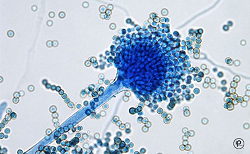Description:
Candida albicans is one of the fungal species most commonly causing life threatening infections in vulnerable patients. Our group is studying the mitochondria in Candida albicans cells.
Just like in our cells the mitochondria are the batteries of the cell, producing energy required for growth and in fungal cells can also influence infection.
The mitochondria can influence components of the fungal cell wall and its ability to infect us.
If we understand how mitochondria are influencing these factors, we can develop new anti-fungals or we can use existing anti-fungals in new combinations in order to tackle life threatening infections.
Lucian Duvenage works in Dr Campbell Gourlay’s lab at the University of Kent
Medical and Patient education videos
-
Title
Description
-

Dr. Rohini Manuel, Consultant Clinical Microbiologist, Public Health England, London
-

Shila Seaton, Bacteriology Scheme Manager, UK NEQAS for Microbiology, Public Health England
-

Dr. P. Lewis White, Principal Clinical Scientist, Public Health Wales Microbiology, Cardiff
-

Prof. Dr. Clemens Decristoforo, Radiopharmacist, Univ.Klinik f.Nuklearmedizin, Innsbruck, Austria
-

Dr. Martin Hoenigl, Infectious Diseases and Tropical Medicine, Medical University of Graz, Austria
-

Dr. Jonathan Lambourne, Consultant in Infectious Diseases, Barts Health NHS Trust, London
-

Dr. Inês Ushiro-Lumb, Lead Clinical Microbiologist for Organ Donation and Transplantation, NHS Blood and Transplant, London
-

Dr. Mike Bromley, Lecturer, Institute of Inflammation and Repair, University of Manchester
-

Dr. Sharleen Braham, Clinical Scientist, King’s College Hospital, London
-

Dr. Duncan Wilson, Research Fellow, Aberdeen Fungal Group, University of Aberdeen
